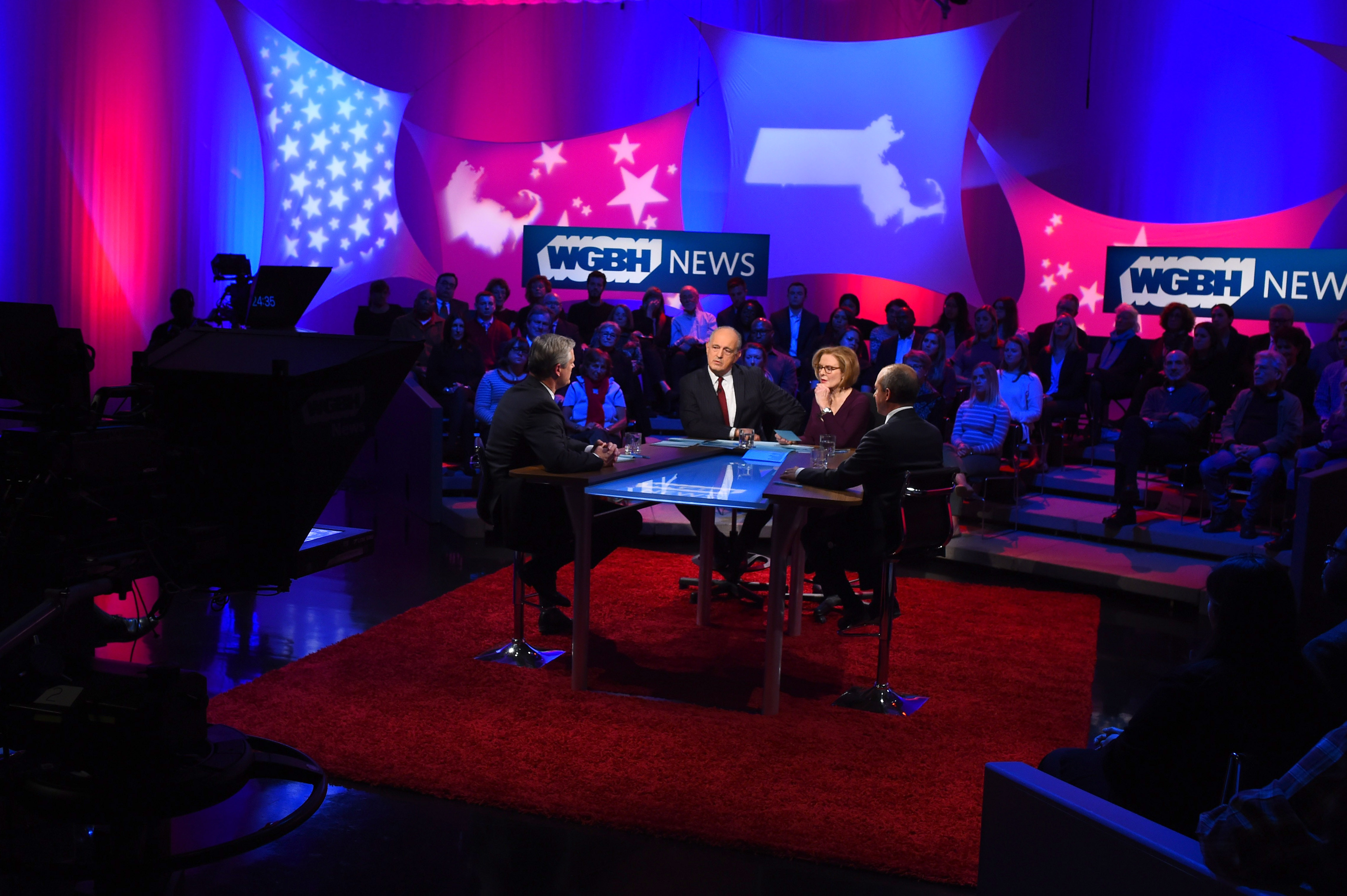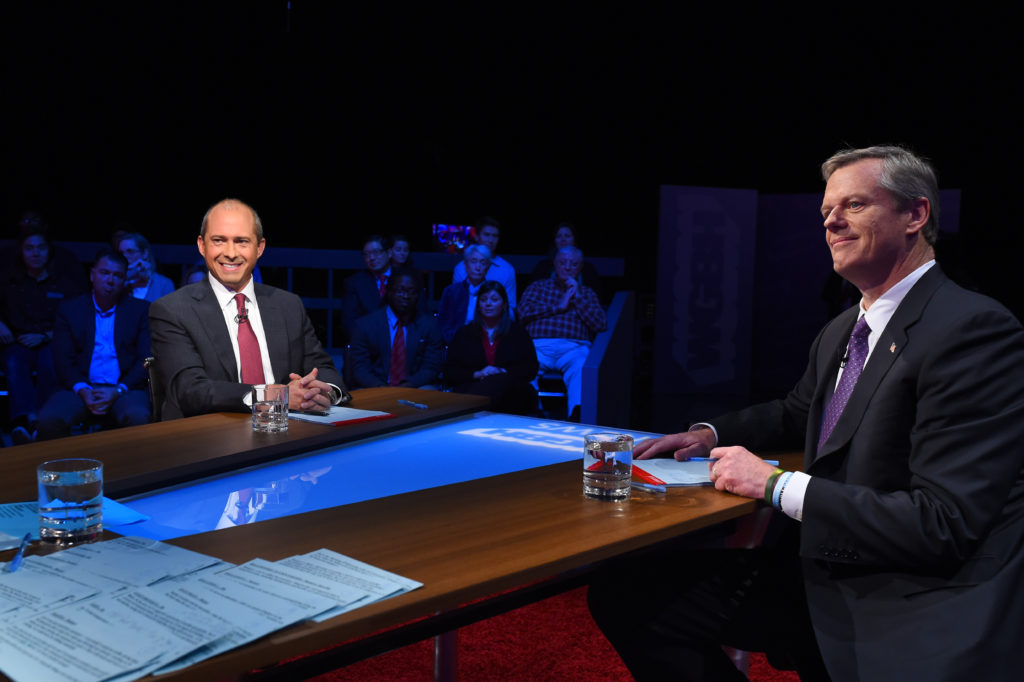Charlie Baker and Jay Gonzalez battle in second gubernatorial debate
Massachusetts Republican Governor Charlie Baker and Democratic nominee Jay Gonzalez square off in the second 2018 Massachusetts Gubernatorial debate at the WGBH Studios in Brighton. / Photo by Meredith Nierman / WGBH News
October 24, 2018
Charlie Baker touted his record in the state’s highest office while Jay Gonzalez rejected the “status quo” during the second gubernatorial debate of the election season Oct. 17 at WGBH Studios in Brighton.
Moderators led the candidates through many of the same issues they discussed during the first debate on Oct. 9, including transportation, scandals in the Massachusetts State Police and energy.
The most contentious moment came when Gonzalez pressed Baker about his support for Geoff Diehl, a Republican who is running against Elizabeth Warren for her seat in the U.S. Senate. Diehl conflicts with Baker on a number of issues such as gun control, LGBTQ+ rights and the appointment of Justice Brett Kavanaugh to the Supreme Court.
During the debate, Baker would not say whether he would vote for Diehl, but said he had promised to support the Republican ticket during primary season. He said he was more concerned with local races than national ones.
“What I worry about are the things that I can fundamentally control, and those are the things that have to do with what state government’s up to,” Baker said, “and when I can concentrate and invest in issues at the federal level, I chase them and I chase them hard.”
Gonzalez and the moderators, Jim Braude and Margery Eagan, pressed the governor on how he could support Diehl and not pledge his vote for the candidate.
“So you’re asking people in Massachusetts to vote for Geoff Diehl and you’re not even going to vote for him?” Gonzalez said, adding that Diehl, who co-chaired Trump’s 2016 Massachusetts organization, “would be a rubber stamp for Donald Trump’s agenda in Washington.”
Immediately following the debate, Baker told reporters in the WGBH studios that he would, in fact, vote for Diehl.

Both candidates said the Commonwealth should invest more in public transportation to improve the system. Baker boasted the $8 billion planned investment over the next five years.
“Between the Red Line, the Orange Line and the Green Line, [the investment] will increase capacity by about 50 percent during rush hour, which makes a huge difference,” he said. “We’ve added 10,000 trips to the commuter rail over the course of the past four years.”
Gonzalez said Baker was not doing enough to address transportation improvements, which he said is the issue he hears about the most on the campaign trail.
“People can’t depend on our public transit system to get to work on time, so I’ve got a plan to deal with it,” Gonzalez said. “I’m going to ask the wealthy to pay $3 billion in additional revenue to invest in our education and transportation systems. We have to be honest to voters that we need to invest more to get our transportation system to where it needs to be.”
More than $1 billion of Gonzalez’ $3 billion plan would come from a 1.6 percent tax on college endowments worth more than $1 billion. A total of nine schools would be affected, including Boston College, Boston University, Harvard University, and the Massachusetts Institute of Technology. Northeastern University, whose endowment is worth less than $1 billion, would not be affected by Gonzalez’ proposed tax.
Braude pressed Gonzalez about the viability of the tax, which has not garnered widespread support from state Democratic leadership and has been opposed by both U.S. Massachusetts Senators Elizabeth Warren and Ed Markey.
“We need public leaders that aren’t going to do the same old stuff, the same old Republican playbook of no new taxes at any cost and we’re just going to have to get by with whatever we have. It’s not good enough,” Gonzalez said. “We are not serving the people.”
In another departure from the “status quo,” Gonzalez has said that he would like to instate single-payer healthcare.
“I’m a former health insurance CEO who thinks we need to get rid of health insurance companies,” he said.
Baker said creating a single-payer healthcare system would not work, citing Vermont, which tried and failed to implement such a system just a few years ago.
“Most people in Massachusetts, while they all have issues and concerns associated with the healthcare system, they think the healthcare that they get and the healthcare that’s delivered here is appropriately among the very best you’re going to find anywhere,” Baker said. “And why you turn the whole system upside down for that, I just don’t understand.”
A WBUR poll conducted in late September found that Baker had a substantial lead over Gonzalez, with 68 percent of those polled supporting Baker and just 24 percent supporting Gonzalez.
The candidates will appear in the last gubernatorial debate Nov. 1.












